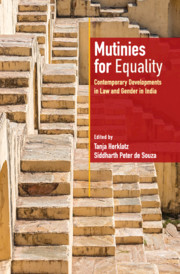9 - Reactionary Executive Versus Deliberative Legislature: The Case of How the Legislature Championed Compensation for Reproductive Labour while Regulating Surrogacy
Published online by Cambridge University Press: 08 June 2021
Summary
Context
In parliamentary democracies such as India, while the government of the day is responsible for piloting legislation to address policy gaps, it is the parliament that deliberates and votes on the proposed law and gives it final shape. Typically, once a bill is introduced in the parliament, it is referred to a standing committee that is composed of members of parliament (MPs) across political parties representing both the Lok Sabha and the Rajya Sabha. The parliamentary standing committee conducts a detailed scrutiny of the bill and invites public feedback on its provisions. Representatives of the ministry piloting the bill and various stakeholders typically depose before the committee in order to clarify their views on the bill.
Over the years, the role of the parliament in influencing the law-making process has been perceived to be declining in India. As seen in Figure 9.1, the number of bills that were introduced and passed in the same parliamentary session has increased: between 2009 and 2014 about 22 per cent of the bills were introduced and passed in the same session in one of the houses of parliament; since 2014, this has increased to 34 per cent. If a bill is passed within a single parliamentary session, there is lesser time for the parliament to examine the provisions of the bill and suggest modifications. This impacts the rigour with which legislative proposals of the government are deliberated and accepted by the parliament. Further, it reinforces the idea that though in parliamentary democracies the legislature controls the executive, in practice legislatures are controlled by the executive.
Another trend that suggests a decline in the legislative impact of the parliament is the decreasing number of bills that are being referred to standing committees before being passed. As Figure 9.2 indicates, fewer bills are now being referred to standing committees, which limits the opportunity for the parliament to evaluate the appropriateness and feasibility of the proposed bill. Standing committees also review bills referred to them from the perspective of how the regulation proposed in the bill addresses the challenges being faced in a sector.
For example, in recent years a range of bills, including those that introduced the goods and service tax and the Aadhaar identification for individuals and the one that extended maternity leave to a period of six months, were passed by the parliament without being examined by a standing committee.
- Type
- Chapter
- Information
- Mutinies for EqualityContemporary Developments in Law and Gender in India, pp. 170 - 184Publisher: Cambridge University PressPrint publication year: 2021



